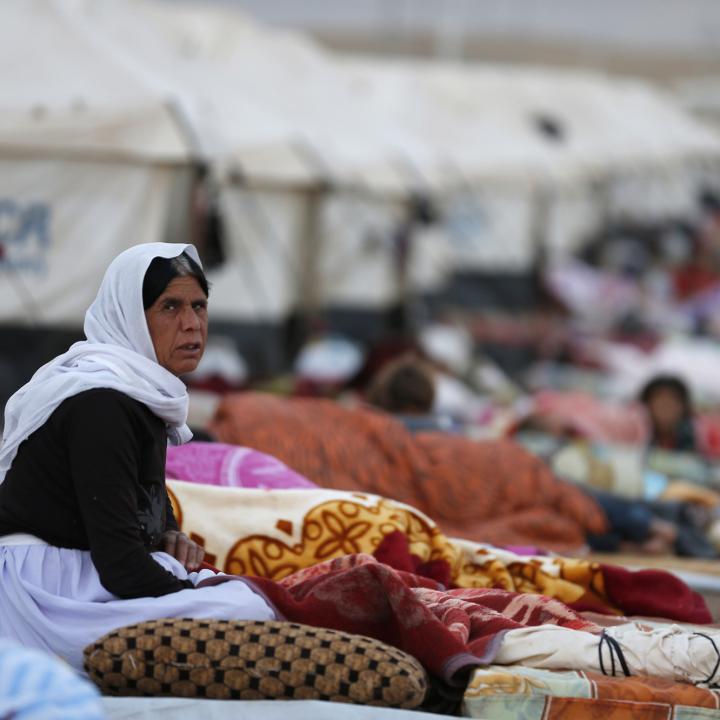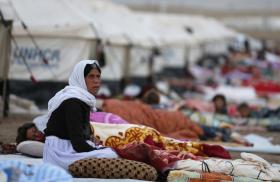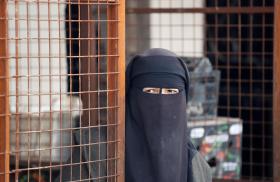
- Policy Analysis
- PolicyWatch 3909
Countering the Islamic State's Gendered Violence and Minority Persecution

Part of a series: Counterterrorism Lecture Series
or see Part 1: U.S. Efforts against Terrorism Financing: A View from the Private Sector
To mark the tenth anniversary of the genocide against the Yezidi people, three experts discuss the Islamic State’s minority atrocities, its systematic use of gendered violence, and the related challenges of repatriation.
On August 1, The Washington Institute held a virtual Policy Forum with Gina Vale, Devorah Margolin, and Pari Ibrahim, the latest event in its Counterterrorism Lecture Series. Vale is a criminology lecturer at the University of Southampton and an associate fellow with the International Centre for Counter-Terrorism. Margolin is the Institute’s Blumenstein-Rosenbloom Senior Fellow; her recent publications include the coedited compilation Jihadist Governance and Statecraft and the essay “In the Shadow of the Caliphate: A Decade of Islamic State Gendered Violence,” coauthored with Dr. Vale. Ibrahim is the founder and executive director of the Free Yezidi Foundation. The following is a rapporteur’s summary of their remarks.
Gina Vale
The anniversary of the Yezidi genocide is an opportunity to reflect on the atrocities that the Islamic State (IS) committed during its occupation of Iraq and Syria and continues to commit today. As part of this process, it is important to understand that the group’s ideology of strict, binary gender roles—in which men are public-facing and militarized while women are confined to the home—helped drive the widespread gender-based violence perpetrated by and against men, women, and children in the “caliphate.” This violence was facilitated by the caliphate’s governance structure and informs current IS practices as well.
Under the caliphate, men and boys affiliated with IS were expected to train for and engage in violence against internal and external enemies, with boys in particular subject to violent indoctrination. In contrast, IS expected women and girls to stay out of public spaces, resulting in enforced domesticity. This system produced gender-segregated institutions throughout the IS caliphate—women were forbidden to leave their homes without a male guardian, forced to obey strict dress codes, deprived of healthcare and education, and subjected to violence and brutalization, sometimes at the hands of other women.
These practices transformed the caliphate’s private sphere into a space of unregulated gendered violence by individual IS members. Women and girls were increasingly subject to forced or underage marriages as dictated by their male guardians.
The IS genocide against the Yezidis and other minorities was justified by the same binary ideology, resulting in violence that often fell along gendered lines. During the group’s initial siege of Sinjar in August 2014, for example, an estimated 3,100 Yezidis were killed and 6,800 kidnapped. Most of the abductees were women and children who were enslaved and subjected to dehumanizing treatment, often at the hands of the wives and female relatives of IS members. Nearly half of those killed—mostly teenage boys and men—were executed en masse.
Accountability and justice for these and other IS victims must be inclusive and locally driven. Accountability is also needed for crimes committed by individual IS members in the private sphere, not just crimes in the public sphere.
Devorah Margolin
IS continues to perpetrate gendered violence even without a physical caliphate, while the international community and local authorities have largely failed to come through with timely and appropriate responses. Today, both the perpetrators and the victims of IS violence exist in limbo, with more than 54,000 men, women, and children held indefinitely across twenty-seven detention facilities and two detention camps in the Democratic Autonomous Administration of North and East Syria (DAANES). Due to its nonstate status, DAANES lacks the authority to deport these individuals.
Moreover, the division and treatment of detainees under DAANES often reflects gender-based assumptions about ideological commitment and risk. For instance, while IS-affiliated men (and some boys) are held in detention facilities, women and children make up the majority of those held indefinitely in camps (approximately 62 percent of residents at al-Hol camp are under age eighteen). Most of the gendered violence in camps like al-Hol has taken three main forms: exploitation of residents by aid workers and security personnel; forced adherence to IS dress and behavioral codes by other residents; and suspected sexual abuse of boys by women who aim to reproduce the “next generation” of IS fighters.
Another major concern about indefinite detention stems from authorities’ perception that boys who come of age within the camps are at high risk of indoctrination. Once these boys reach a certain age, they are often separated from their families and placed in DAANES-run “rehabilitation” facilities. If they are not subsequently repatriated before they turn eighteen—a rare occurrence given the international community’s reluctance to repatriate their citizens—they can be transferred to adult detention facilities. In other words, instead of preventing indoctrination, this “conveyor belt of incarceration” actually puts boys at higher risk for further violence and indoctrination at the hands of men held in adult prisons and similar facilities.
The international failure to repatriate detainees is also the biggest barrier to holding IS members accountable and pursuing justice for victims. DAANES has encouraged repatriation and granted amnesty for some Syrian detainees and IS-affiliated families in areas controlled by the Syrian Democratic Forces (SDF), while an estimated 3,600 third-country nationals (TCNs) have been returned or repatriated to forty different countries since 2019. Yet the international community seems fatigued with these efforts—TCNs from more than sixty countries are still detained in Syria alone, and at least thirty-five of these countries have not made any effort at repatriation.
Even when it does happen, the process of repatriation and accountability falls along gendered lines. With many countries reluctant to repatriate men and teenage boys, women make up the majority of repatriation cases—and, by extension, the majority of those prosecuted abroad for terrorism or other crimes, despite being relegated to periphery roles under the IS structure.
Pari Ibrahim
The Yezidi community has yet to have its day in court, and many feel that the international community has failed them. From the beginning, they have requested an international or hybrid tribunal to hold IS perpetrators accountable for the genocide and achieve closure. Instead, the international organization UNITAD was established to investigate, collect, and preserve evidence of crimes committed against the Yezidis, with millions of dollars invested toward this goal. UNITAD is now scheduled to shut down prematurely this September with little achieved in terms of accountability and few ideas on how to move forward.
In general, IS members and affiliates tend to be charged with terrorism-related offenses but not core international crimes such as mass rape and murder. This is often due to the perception that obtaining indictments and convictions on terrorism charges is easier. The Islamic State is certainly a terrorist organization, but it is also a genocidal organization, and the Yezidi community needs to see IS members charged for those genocidal crimes as well. Although collecting and presenting evidence of such crimes may be more difficult, the evidence clearly exists, including in the United States. Thus far, IS affiliates have been (or will be) indicted for core international crimes in a few cases in Belgium, Germany, the Netherlands, and Sweden, but these examples are just a drop in the bucket of crimes committed against the Yezidi people.
At the same time, authorities in Iraq and DAANES-controlled areas of Syria are increasingly granting amnesty to IS family members and possible perpetrators due to resource constraints, with no real consideration of the crimes they may have committed against Yezidis or others. With UNITAD closing, countries may be even more inclined to take the easy way out and decline charging individuals with core international crimes due to the perceived lack of evidence.
In theory, the international community has ample laws and regulations in place for investigating and prosecuting violations against the Yezidi people and other victims. In practice, however, this system is not working. Justice and closure cannot be achieved simply by offering symbolic recognition of the crimes committed against Yezidis, nor by asking them to “move on” and return to homes where their neighbors may have joined or helped IS. They deserve a chance at an international or hybrid tribunal.
In Iraq, justice could also take the form of increased Yezidi representation in parliament. Technically, the Iraqi government is responsible for taking care of all its citizens, but in reality, only those with sufficient political representation are afforded security, resources, and funds.
This summary was prepared by Nidal Morrison. The Policy Forum series is made possible through the generosity of the Florence and Robert Kaufman Family.








